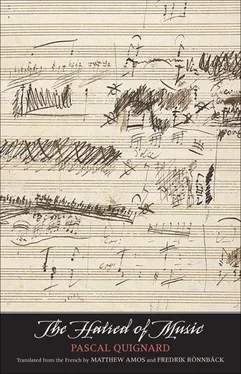We are the fruit of a shock between two pelvises, naked, incomplete, ashamed before one another, whose union was noisy, rhythmic, moaning.

Hearing and obeying.
The first time Primo Levi heard the band play Rosamunda at the entrance of the camp he could barely suppress the nervous laughter that seized him. Then he saw the battalions returning to the camp with a strange gait: advancing in rows of five, almost rigid, their necks strained, their arms against their bodies, like men made out of wood, the music lifting their legs and tens of thousands of wooden clogs, contracting their bodies like those of automata.
The men were so weakened that their leg muscles against their will obeyed the power of the rhythms that the music of the camp imposed and that Simon Laks conducted.

Primo Levi called music “infernal.”
Although not given to imagery, Primo Levi wrote: “Their souls are dead and it’s the music that pushes them forward as the wind does dry leaves, and takes the place of their will.”
Then he underlines the esthetic pleasure the Germans felt before such matutinal and vespertine choreographies of misfortune.
It was not in order to assuage their pain, nor was it to win the favor of their victims, that the German soldiers provided music in the death camps.
1. It was in order to increase their obedience and to bind them together in the impersonal, nonprivate fusion that all music engenders.
2. It was for pleasure, esthetic pleasure and sadistic enjoyment, felt upon hearing beloved songs and seeing a ballet of humiliation performed by a troupe of those who bore the sins of those who humiliated them.
It was a ritual music.
Primo Levi laid bare the oldest function assigned to music. Music, he writes, was felt to be a “malediction.” It was a “hypnosis of continuous rhythm that annihilates thought and numbs pain.”

I will add what the second and fifth treatises have perhaps shown: music, founded on obedience, derives from the death call. 1

Music is already fully present in the whistle blow of the SS. It is an effective force; it provokes an immediate attitude. Like the camp bell causes everyone to wake up, interrupts the oneiric nightmare to give way to the nightmare of reality. Every time, sound says: “stand up.”

The secret function of music is convocative.
It is the cock’s crow that makes Saint Peter suddenly dissolve into tears.

In Virgil, Alecto climbs onto the roof of a barn and sings ( canit ) into the curved horn ( cornu recurvo ) the signal ( signum ), which assembles the shepherds. Virgil says that this sound is an “infernal voice” ( Tartaream vocem ).
All the farmers arm themselves and come running.

How can one hear music, any music , without obeying?
How can one hear music from the outside of music?
How can one hear music with closed ears?
Simon Laks, who conducted the orchestra, was not himself any more “exterior” to music just because he conducted it.
Primo Levi continues: “One had to hear it without obeying, without being subjected to it, to understand what it represented, for what premeditated reasons the Germans had instituted such a monstrous rite, and why even today, when one of these innocent little songs comes back to us in memory, we feel the blood turn to ice in our veins.”
Primo Levi continues by saying that these marches and these songs were burned into the body: “They will be the last thing from the Lager we will forget, for they are the voice of the Lager .” It is the instant when the resurgent hum assumes the form of the tarabust. The melos tarabusts the bodily rhythm, merging with the personal acoustic molecule; at that point, Primo Levi writes, music annihilates. Music becomes the “sensory expression” of the determination with which humans proceeded to exterminate humans.

The bond between mother and child, the recognition of one by the other followed by the acquisition of the mother tongue, are forged in a very rhythmic acoustic incubation that predates the moment of birth and continues thereafter, recognizable by cries and voice exercises, then by ditties and nursery rhymes, names and nicknames, recurring and restraining phrases that become orders.

Intrauterine hearing is described by naturalists as remote since the placenta distances the noise of the heart and the intestines, the water reduces the intensity of the sounds, making them deeper, transporting them in large waves massaging the body. Deep in the uterus thus reigns a low and constant background noise, which acousticians compare to a “muffled whisper.” The noise of the outside world itself is perceived as a “muffled, soft, low drone” above which rises the melos of the mother’s voice, repeating the tonic accent, the prosody, the phrasing that she adds to the language she speaks. This is the individual basis of the hum.

Plotinus, Enneads V , 8, 30.
Plotinus says that “sensory music is engendered by a music that is anterior to the sensory.” Music is related to the other world.

In the mother’s womb, the heart of the embryo allows the child to endure the noise of the mother’s heart and to transform it into its own rhythm.

Music is irresistible to the soul. Therefore it suffers irresistibly.

An inevitable acoustic assault premeditates life itself. Man’s respiration is not human. Before the emergence of Pangaea, the pre-biological rhythm of waves anticipated cardiac rhythm and the rhythm of pulmonary respiration.
The rhythm of the tides, related to the nychthemeral rhythm, splits us in two. Everything splits us in two.

Prenatal hearing prepares for the postnatal recognition of the mother. Familiar sounds outline the visual epiphany of the mother’s unknown body, which the newborn abandons like a dead skin.
As the mother softly sings, her arms immediately reach out toward the cry of the infant. Without rest these arms rock the child like an object that is still floating.
From the first hour, sounds in the air cause the newborn to wince, modify the respiratory rhythm (the breath, that is, the psychè , that is, the animatio , that is, the soul), transform the cardiac rhythm, make the eyes blink and the limbs move in an uncoordinated way.
From the first hour, hearing the cries of other newborns sets off his own agitation and makes him shed his own tears.

Читать дальше













